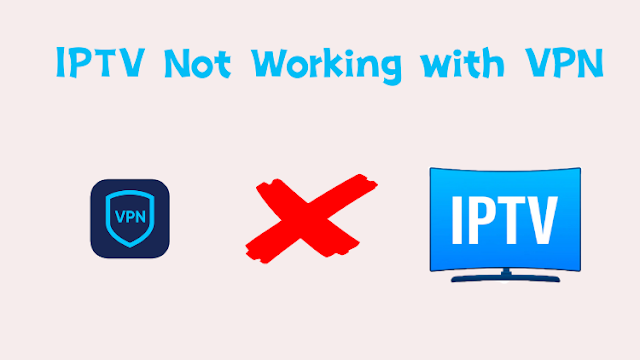IPTV Not Working with VPN: Why and the Solution - IPTV Premium
IPTV services continue to become more popular and a viable alternative to satellite and cable subscriptions.
Many subscribers use VPNs to watch IPTV, and doing so has many benefits. However, they may notice that their IPTV does not work with a VPN in some cases.
There are many reasons why your IPTV stream may not be working correctly, and in this article, we will provide all the information you need to make it work smoothly over a VPN.
What is VPN
A Virtual Private Network (VPN) is a type of network technology that allows users to connect to the internet securely and privately. VPNs use encrypted connections and tunneling protocols to protect your online data and traffic and can be used to access a wide range of online services and content, even if they are blocked or restricted in your location.
VPNs are commonly used by individuals and businesses to protect their online privacy and security, unblock websites and content, and access online services that may not be available in their location. VPNs can also be used to securely access a corporate network or another private network from a remote location.
There are many different VPN providers available, and the best one for you will depend on your specific needs and preferences.
VPN has three main functions.
- Protects your identity by hiding your online behavior from Internet service providers
- Unlocks censored content in areas with strict Internet laws
- Helps you fake your digital location to access region-specific content and services, such as the U.S. versions of Netflix or Hulu
Should I use a VPN when watching IPTV
It's generally a good idea to use a VPN when watching IPTV, as it can help protect your online privacy and security while streaming. VPNs encrypt your internet traffic and mask your IP address, making it difficult for anyone to track or monitor your online activities.
This is particularly important when using IPTV, as it can be difficult to know who is watching your traffic and what they are doing with it. Additionally, using a VPN can allow you to access IPTV services and channels that may be blocked or restricted in your location.
This can be useful if you want to access content that is only available in certain countries, or if you want to unblock channels that are not available in your area. Overall, using a VPN when watching IPTV can provide you with a more secure and private streaming experience.
What are the disadvantages of using a VPN for IPTV
One of the main disadvantages of using a VPN for IPTV is that it can potentially slow down your internet connection. VPNs encrypt your internet traffic and route it through a remote server, which can add some additional latency and reduce the speed of your connection.
This can be particularly noticeable when streaming high-quality video content, such as HD or 4K IPTV, and can result in buffering and other issues. Additionally, using a VPN can potentially cause compatibility issues with some IPTV services and devices. Some IPTV providers and devices may not work well with VPNs or may be configured to block VPN traffic.
This can prevent you from accessing certain services or channels, or cause other issues with your IPTV connection. Finally, using a VPN can add an additional cost to your IPTV setup, as most VPN providers charge a subscription fee.
While many VPNs offer free plans with limited features, these may not be suitable for streaming IPTV, and you may need to upgrade to a paid plan to get the best performance and access to all the features you need.
Why IPTV doesn’t work with VPNs
In general, IPTV should work with VPNs, as both technologies are designed to allow users to access and transmit internet-based content. However, there are some potential issues that can prevent IPTV from working with VPNs, or cause problems with the quality and stability of the connection.
One of the main reasons why IPTV may not work with VPNs is that some IPTV providers and devices are configured to block VPN traffic. This can be done for a variety of reasons, such as to prevent users from accessing content that is restricted in their location or to ensure that only authorized users can access the service.
If an IPTV provider or device blocks VPN traffic, it may prevent you from connecting to the IPTV service or cause other issues with your connection. Additionally, using a VPN can potentially slow down your internet connection, which can cause buffering and other issues when streaming IPTV.
This is because VPNs encrypt your internet traffic and route it through a remote server, which can add some additional latency and reduce the speed of your connection.
Finally, some VPNs may not be optimized for streaming IPTV, and may not provide the fast and stable connections that are needed for high-quality video content. It's always a good idea to do some research and compare different VPNs to find one that is suitable for IPTV.
What are the best VPNs for IPTV?
There are many different VPN providers available, and the best one for you will depend on your specific needs and preferences. Some popular VPNs for IPTV include ExpressVPN, NordVPN, and CyberGhost VPN.
These VPNs offer fast and reliable connections, strong encryption to protect your online privacy and security, and access to a wide range of IPTV services and channels. Additionally, they have a proven track record of unblocking geo-restricted content and providing a stable and consistent connection for streaming.
It's important to note that no VPN can guarantee access to all IPTV services and channels, as these can vary depending on your location and the specific service you are trying to access. It's always a good idea to do some research and compare different VPNs before making a decision.
Conclusion
Overall, there is no doubt that using VPNs when using IPTV is a good practice. The enhanced security, privacy, and in some cases speed, make them a great add-on to the IPTV viewing experience.
Every IPTV user should consider using a VPN to ensure that no one can see that you are using an IPTV service.
Now you’ll know what to do when you encounter issues related to IPTV not working with VPNs, and you should be able to easily resolve those issues so you can get back to streaming your favorite live TV and sports shows.



Comments
Post a Comment